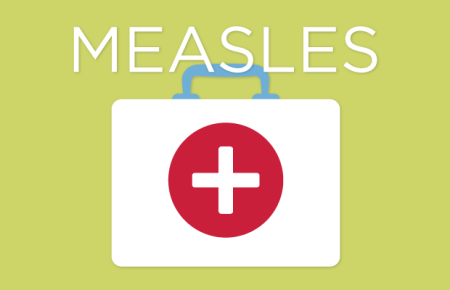There are more than 120* confirmed cases of measles is in the U.S., according to the Centers for Disease Prevention and Control (CDC).
 Cases are happening in Arizona, California, Florida, Georgia, Illinois, Indiana, Louisiana, Maryland, Michigan, Minnesota, Missouri, New Jersey, New York City, Ohio, Pennsylvania, Virginia and Washington. Wisconsin has no confirmed cases, but cases have been identified in neighboring states – Illinois, Michigan and Minnesota.
Cases are happening in Arizona, California, Florida, Georgia, Illinois, Indiana, Louisiana, Maryland, Michigan, Minnesota, Missouri, New Jersey, New York City, Ohio, Pennsylvania, Virginia and Washington. Wisconsin has no confirmed cases, but cases have been identified in neighboring states – Illinois, Michigan and Minnesota.
In 2019, the U.S. reported the greatest number of cases since 1992. There were more than 1,200 cases confirmed in 31 states. Since then, cases have gone down from that record high, with 58 instances in 2023. Measles is more likely to spread and cause outbreaks in U.S. communities where groups of people are unvaccinated.
Dr. Michael Sullivan, Marshfield Clinic Health System pediatrician, provided key facts regarding measles.
What you should know about measles:
- Measles spreads person-to-person via airborne and direct contact with bodily secretions such as mucus and saliva.
- Measles is very contagious. Symptoms appear 7 to 14 days after contact with the virus and typically include high fever, cough, runny nose, and watery eyes. A measles rash appears 3 to 5 days after the first symptoms.
- There is more concern beyond developing a rash. One in 20 people with measles will develop bacterial pneumonia. One in 10 will develop a middle ear infection. For every 1,000 people infected, one or two people will die as a result.
- The infection often enters the U.S. through infected travelers who may contract it from under vaccinated countries. Make sure you are vaccinated before traveling internationally.
- Remember, measles is extremely infectious, but it may be prevented if the vaccine is given within 72 hours of exposure.
Measles (MMR) vaccine provides protection
You can prevent measles by a safe and effective vaccine. This vaccine is part of the routine, recommended childhood vaccine schedule. Vaccines have saved millions of lives and no scientific evidence exists linking vaccines to autism.
In most cases, if patients have not received the measles, mumps, and rubella (MMR) vaccine, the Advisory Committee on Immunization Practices and the CDC recommend vaccination. Patients should talk to their provider about any questions regarding measles.
Health care providers recommend children receive the MMR vaccine at ages 12-15 months and again at 4-6 years before starting school. The measles vaccine is given in two doses. It is 97% effective in preventing measles and offers lifelong protection. In rare cases of measles occurring post-vaccination, symptoms are usually mild.
“Young infants and people with weak immune systems cannot receive the vaccine,” said Dr. Sullivan. “They depend on others around them to receive vaccinations to keep them safe.”
For more information visit:
For questions about the measles vaccine, talk to a Marshfield Children’s provider.
Schedule appointment Message your provider
Related Shine365 articles
What is the childhood immunization schedule?
Advice for new parents: Help keep your new baby healthy and safe
*Editor’s note: This post was updated April 2024 to reflect current measles data.

